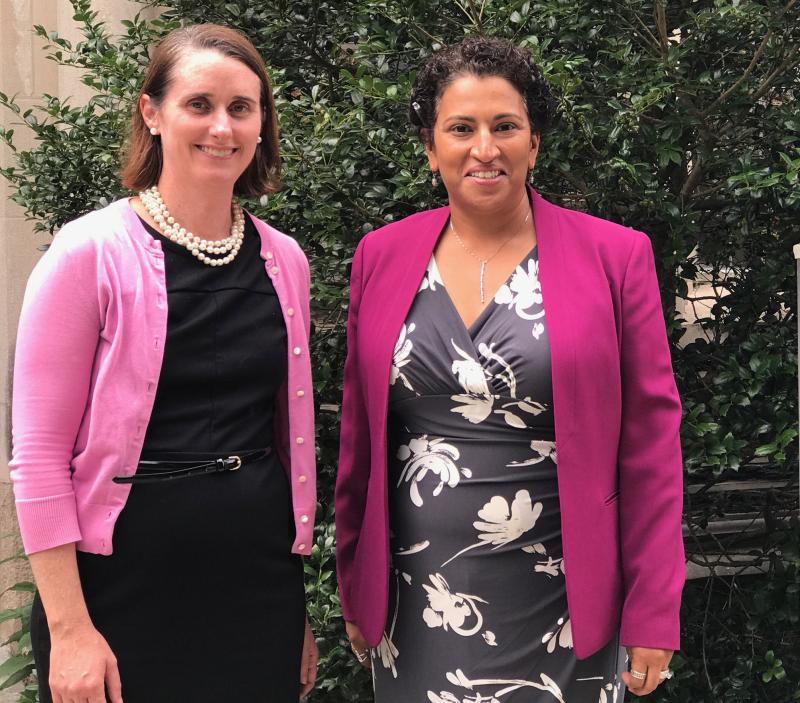
Duke University and the Duke-National University of Singapore (NUS) Medical School have awarded Duke Ob/Gyn's Geeta Swamy, MD; and colleagues Sallie Permar, MD, PhD, and Eng Eong Ooi, BMBS, PHD, a $200,000 grant for their Duke/Duke-NUS pilot project, titled “Relationship Between Maternal Humoral Immunity and Fetal Outcome of Maternal Zika Virus Infection."
Dr. Swamy is Associate Professor of Ob/Gyn and Vice Chair for Research and Faculty Development in the Department of Ob/Gyn. She serves as Vice Dean and Associate Vice Provost for Scientific Integrity for Duke University and the School of Medicine. Dr. Sallie Permar is Professor of Pediatrics, Molecular Genetics, Microbiology and Immunology at the Duke School of Medicine and the Duke Human Vaccine Institute. Dr. Eong Ooi is Professor of Emerging Infectious Diseases at Duke-National University of Singapore Medical School.
Presented here is a Q/A with Dr. Swamy:
What was your inspiration for seeking this funding
As an obstetrician and physician-scientist, I have dedicated my career to improving the lives of women and their families through research in pregnant women and their infants. My research focuses on infectious diseases, and more specifically, maternal immunization as a means of preventing infections in mothers and infants. Emerging infections like Ebola and Zika viruses pose significant risk for the population at-large. However, pregnant women and their fetuses are often more susceptible or vulnerable due to immunologic changes during pregnancy and the limitations of testing novel therapies during pregnancy without prior safety data in nonpregnant individuals. Zika infection during pregnancy is associated with poor neonatal outcomes, including severe brain malformation, microcephaly, and neurologic damage. These alarming fetal consequences could result in a generation of disabled children, leaving a considerable societal burden for decades to come. Building upon our shared interest in the prevention of congenital infection, Dr. Sallie Permar and I expanded upon our existing collaborative relationship to obtain funding to conduct research in Zika infection during pregnancy. Dr. Permar is a pediatric infectious physician-scientist whose research focuses on the prevention and treatment of perinatal viral infections.
What is your personal goal; what would you like to accomplish?
The goal of this study is to learn how maternal antibody responses to Zika infection affect fetal transmission and neonatal outcome through research in a multi-national cohort of pregnant women infected with Zika and other flaviviruess. We also hope to learn how preexisting maternal cross-reactive and neutralizing antibody responses impact fetal outcome following maternal Zika infection. Our ultimate goal is to use the findings of this study to inform the development of an effective Zika vaccine that could be given either before or during pregnancy to protect infants against Zika-associated birth defects.
How do you feel global partnerships are beneficial?
We expanded upon our existing collaborations to work with investigators at the Duke National University of Singapore and the Universidade Federal do Espírito Santo of Brazil. By assembling an international team, we are able to leverage expertise in the following:
1) obstetric clinical research enrollment at international sites
2) immunology at the maternal-fetal interface
3) flaviviruses like Zika, Dengue, and Yellow Fever and associated antibody-dependent enhancement. In addition, establishing strong global partnerships is imperative for moving research from observation to intervention to treatment in low resource settings. The Duke/Duke-NUS co-funding grant mechanism is an ideal opportunity to support our research.
Acknowledgments
We are eager to move forward with our proposed collaboration with Drs. Eng Eong Ooi and Thiam Chye Tan from Duke-NUS, and Dr. Reynaoldo Dietze from UFES-Brazil. We appreciate the selfless contribution of the affected women and children who have and continue to enroll in our study.